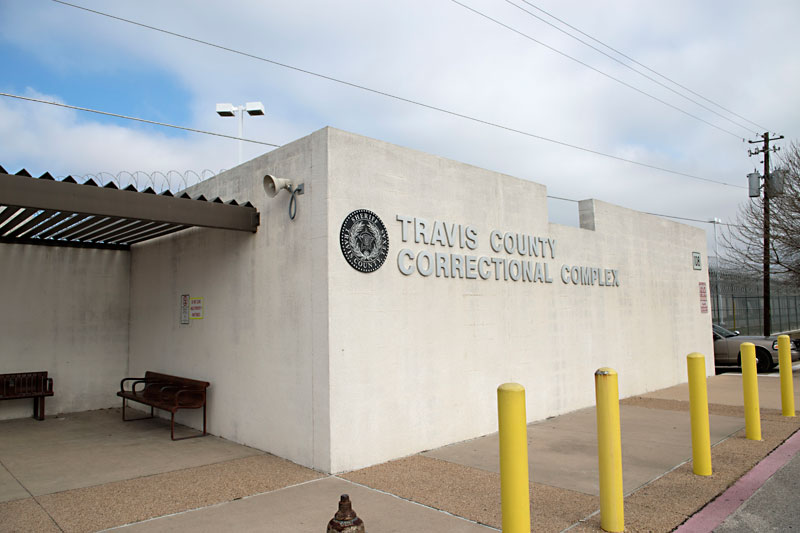Travis County Moves to Stop Jailing Austinites With Mental Illness
Leaders commit to 100-day deadline to overhaul mental health services
By Lina Fisher, 2:45PM, Wed. Jun. 7, 2023
Countywide, those that have the power to mitigate a growing mental health crisis agree: It can’t be done within the criminal justice system.
Marking the official beginning of long-term, community-wide collaboration on the mental health crisis in the Travis County Jail, representatives from public and private health care sectors, the Austin Police Department, the Travis County Sheriff’s Office, and City Council, among others, attended the County Commissioners Court’s daylong town hall June 5, to discuss an overhaul of the county’s mental health services. This coalition is working to implement extensive findings from last year’s commissioned Dell Medical School study of the county’s current mental health care system. On March 21, the county voted to authorize a diversion center pilot, meant to divert those experiencing mental health crises away from the jail and into community services. Monday, more than 75 stakeholders signed an agreement committing them to launching that pilot, “focused on services and housing,” which aims to connect data across the criminal, legal, and health care systems; establish a community engagement process; and estimate an annual operating cost within 100 days (so, before October).
In a press conference between sessions, County Judge Andy Brown outlined the scope of the crisis: Currently there are 106 people in jail with a mental health designation, each with between three and 89 arrests, 75% of which are misdemeanors. Criminal trespassing makes up the majority of those, at 55% – Brown says most of these people could be diverted before arrest or once they get to the jail and sent to an alternative facility: a diversion center.
The jail is not only unsuited to provide mental health care, but the sheriff’s office is in the midst of a full-blown staffing crisis, despite investments in pay and recruitment. (Within the sheriff’s office, corrections officers have a 35% vacancy rate, 911 dispatchers are at 33%, counseling staff 22%, and deputies 14%.) Sheriff Sally Hernandez said she supports the plan because “as this population keeps growing, it’s very difficult for [staff] to take care of the amount of people with mental health designations.” A diversion center would provide a place for people in crisis to stabilize and be connected with supportive housing instead of incarceration, reducing the number of repeat arrests for police and the strain on jail staff.
“We are not just talking about a criminal justice problem,” said County Attorney Delia Garza. “It's a public health issue. It’s a result of poor public policies and lack of collaboration.” County leaders have noted that even the services they do have are not being connected to those flagged by one entity for a mental health need, as different sectors like health care and criminal justice lack data-sharing mechanisms. There’s also not enough supportive housing; many crisis-stabilization centers close on weekends or evenings, said Commissioner Ann Howard, advocating for 24/7 care and extending the available stay to 90 days: “During that time there can be a warm handoff to a supportive housing environment,” she said. “The county needs a well knitted trampoline, instead of a safety net with holes in it.”
Travis County is certainly not the first to try a comprehensive diversion program and has many success stories to learn from for this pilot. With its diversion program that began in 2000, Miami-Dade County was able to close one of its jails – saving taxpayers $12 million a year – and decrease its overall jail population by 40%. Nashville’s model diverts people before they’re even arrested, which is Brown’s preference for Travis County’s design, to avoid the shackles of a criminal record. Currently, “pre-arrest diversion from jail is for the most part only available to people who are willing and able to engage with mental health treatment,” said Howard, and post-arrest diversion is not available at all.
Though the details of design will be worked out in this 100-day challenge period, Brown likes Nashville’s model, where people complete a stabilization period of 14-30 days in a diversion center and their charges are expunged at the end. He says diversion could also help people already in jail and awaiting competency restoration needed to stand trial or get a plea agreement. Some have been waiting in the jail for two years due to an egregiously long state hospital backlog.
Though diversion could alleviate the wait times for this population as well, “if we just set up an awesome diversion center or competency restoration center, that will very quickly fill up if we don't have all these other assets in the community,” said Brown. Thus, the first goal of the pilot is ramping up mental health and housing services in the community broadly, as well as emergency response outside the criminal justice system so it never gets to the point of law enforcement interaction. Such comprehensive system-wide changes may take a while, warned Howard: “Miami jokes that they are a 23-year overnight success … so it’s gonna take time. We just have to get started.”
The next opportunity for public participation in the debate on the diversion center and larger mental health programming is a town hall set for July 25.
Got something to say on the subject? Send a letter to the editor.
A note to readers: Bold and uncensored, The Austin Chronicle has been Austin’s independent news source for over 40 years, expressing the community’s political and environmental concerns and supporting its active cultural scene. Now more than ever, we need your support to continue supplying Austin with independent, free press. If real news is important to you, please consider making a donation of $5, $10 or whatever you can afford, to help keep our journalism on stands.
April 19, 2024
April 19, 2024
Travis County Jail, Andy Brown, Sally Hernandez, Delia Garza









